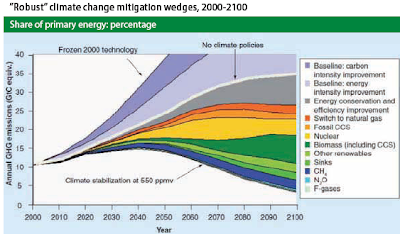
This UN study is asking for 3% of world GDP for an accelerated conversion to green technologies, revamping agriculture according to their agenda and tossed in poverty elimination. I see zero chance of this proposal being adopted. They are asking for 20 times more than what was rejected at Copenhagen. It is interesting to see what kinds of plans get created by the United Nations and to imagine what the world would be like if these kinds of plans actually had serious consideration.
The long lifetimes of power plants, refineries, buildings and energy infrastructure make any energy transition necessarily a long-term affair. Global replacement costs of existing fossil fuel and nuclear power infrastructure are estimated at, at least, $15 trillion–$20 trillion (between one quarter and one third of global income).
Many countries are already making efforts to foster a greener energy supply system, including through investments in energy innovation, feed-in tariffs and other price measures, and regulatory measures and efficiency standards designed to promote energy efficiency and diffusion of renewable and clean sources of energy. The Survey indicates, however, that the pace of progress of technological change is nowhere near that needed to reach the goal of full decarbonization of the global energy system by 2050.
In accelerating technological transformation to meet emissions and energy-use targets, the Survey recommends that policies and actions be guided by four key goals.
- Improving energy efficiency in end use without expanding consumption where energy-use levels are already high
- Supporting a broad energy technology development portfolio globally while adapting more mature technologies in specific locations
- Supporting more extensive experimentation and discovery periods
- Using “smart” governance and accountability strategies in energy-related technological development
Please read on at NBF





























 The EPA maintains State Resource Locators and contact information for several topics: Air Quality – Ambient
The EPA maintains State Resource Locators and contact information for several topics: Air Quality – Ambient









Connect with EHS News